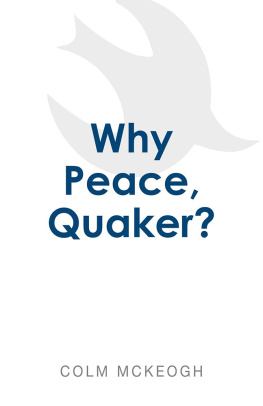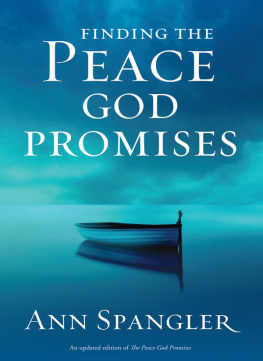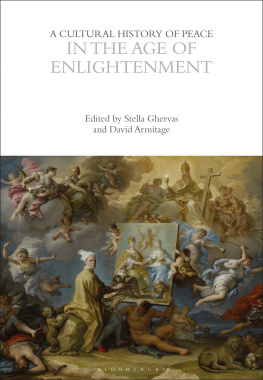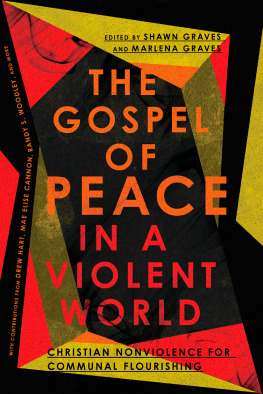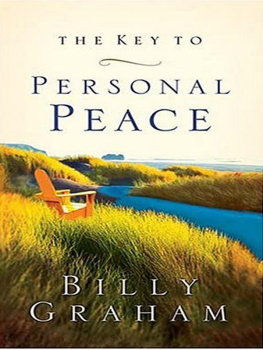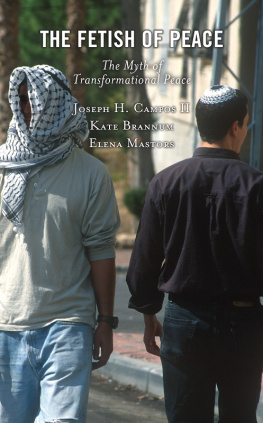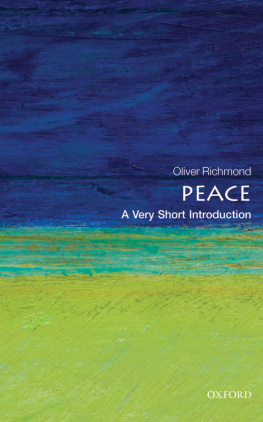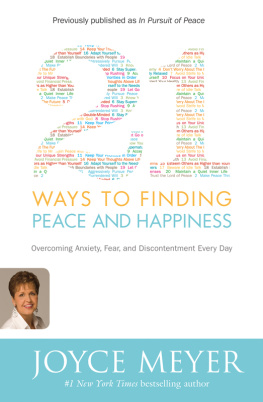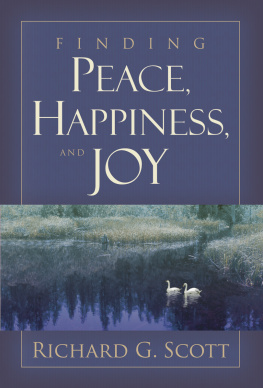This work was inspired by Colin McCahons Crucifixion According to St Mark (1947), sparked by my student Roger Langs study of the sermon on the mount, and written while employed at the University of Waikato, New Zealand.
Why is peace important to me as a Quaker? Quakerism is not the peace testimony and the peace testimony is not pacifism but peace is indeed a goal many Quakers pursue along with the dignity, equality and well-being of people, the sustainability of our societies and the health of our planet. Quakers often engage in politics and seek power and so the means they use are not pacifist but political as they seek to change law and policy to improve and safeguard human dignity and well-being. Many advances in human welfare have been secured in part through the coercive enforcement of law, rights and order although Quakers wish to emphasize the role that consensus, conscience, and cooperation play in social progress. Nonetheless peace continues to have a special place in Quakerism as a long-established social testimony.
Peace has a special place too in the Christianity from which Quakerism came. No religion has been there through the whole of the human story. Every religion has come into being at some point in history and many have already ceased to be. The Christian religion has at its center Jesus of Nazareth, who lived two thousand years ago in the Jewish provinces of their empire that the Romans called Palestine. The people he came from took a moral view of life. The book of Genesis tells a story of creation in which God said, Let there be light, and there was light. God saw that the light was good. The faith of the Jews gave meaning and purpose to human life by connecting what goes on in this universe to what is outside it. People are not products of chance but creatures of that creator and that is the foundation of their human worth.
Bad is human disloyalty to that which caused them to be. In the Genesis story of Adam and Eve in the Garden of Eden, God creates human beings in his own image. He says to Adam, You are free to eat from any tree in the garden; but you must not eat from the tree of the knowledge of good and evil, for when you eat from it you will certainly die. They are banished from the Garden of Eden and must join in the struggle to survive that ends in death.
The descendants of Adam and Eve work to live alongside all other creatures but they are unique among creation in knowing of good and evil and seeking guidance and meaning in life. Matthews gospel gives the genealogy of Jesus, son of Joseph, and lists forty-two generations of ancestors but, like everyone, he is a descendant of the survivors in the contest for life and all who hear his words are also the product of victory in violent and fierce competition. For Jesus to be, his forbears must succeed in life and battle. There is a time for everything, and a season for every activity under the heavens: a time to be born and a time to die, a time to plant and a time to uproot, a time to kill and a time to heal, a time to tear down and a time to build, a time to weep and a time to laugh, a time to mourn and a time to dance, a time to scatter stones and a time to gather them, a time to embrace and a time to refrain from embracing, a time to search and a time to give up, a time to keep and a time to throw away, a time to tear and a time to mend, a time to be silent and a time to speak, a time to love and a time to hate, a time for war and a time for peace.
God speaks often in the Jewish scripture and issues many commands. The ancestors of Jesus believed that God heard them, spoke to them, guided them, fed them, protected them, and gave them land and victory in battle. Moses brings the Ten Commandments down the mountain and says to the people that the fear of God will be with you to keep you from sinning.
Jesus lives at a time when the Jewish people have come under Roman rule and Greek culture has spread around the Mediterranean. He spoke Aramaic and may have spoken Greek. He was literate and the gospel of John depicts him writing on the ground but we have no record of anything he wrote and probably no record of anything he said in the language in which he said it. We do have accounts by others of his acts and words in Greek, written down perhaps many decade after his death, but of the origins of these gospels and their authors almost nothing is known. It is not possible to be sure what Jesus said or what he meant and even to establish what is most likely would require expertise in ancient languages and culture. That is not the purpose of this book which seeks instead to give a Quaker attitude to peace and uses the four canonical gospels for this purpose. Quakerism is not gospel-based but spirit-led but these writings show the purpose and importance of peace.
In the gospel of Matthew, Jesus describes the human potential. Be perfect as your heavenly father is perfect , he says in the sermon on the mount. What is the human potential? What would fully developed human beings be like? There can be very different answers to this question but to Jesus they are people of depth, resilience, resourcefulness and patience, spirited people who are fully alive and creative in their interactions. They are people who can make peace possible by finding ways, not only to resolve conflict without violence, but also to uphold their human dignity without depending on or demeaning others. Violence can be too quickly resorted to when we are fearful, impatient, unimaginative, proud of spirit or uncaring. The sermon highlights how, with the spirit alive in them, people can assert their humanity and dignity in creative ways. It shows how it is possible to be all a human being can be regardless of the actions or reactions of others and yet in a way that acknowledges the autonomy of others and leaves open to them the opportunity to join in as co-creators of the future.
In the gospel of Mark, Jesus says that great change is possible and that is it is in the power of spirited people to bring it about. Far from there being little scope to alter the human condition, Jesus sees a very great change as immediately possible. His message to his listeners was not that they were unable to overcome a corruption of their human nature by their own efforts or that they could do nothing but sin. On the contrary, throughout Marks gospel, he presents the Kingdom of God as tantalizingly close and urges people to have more faith in their own ability and not to look to him. Peace was a feature of the kingdom to which the Jews looked forward and Jesus told them that it was at hand. The changes we wish to bring about are not themselves the motivation to improve the world. The commitment and staying power come from elsewhere, from a faith that is powered by spirit and motivated by the love. If we give up hope too soon, we may be giving up on peace too soon and the violence we resort to may be unnecessary.
In the gospel of Luke, Jesus talks of a spirit of neighborliness that crosses borders. What is the relationship of Jesus to the people around him? He was an individual, so separate from them that he will die and the others go on living, and yet not so separate as he speaks in words he did not coin, expressing his thoughts in language others made, even when alone. Each person is both an individual human being and a member of communities, societies, cultures and of the human species and is inexplicable without reference to them. There exists a dimension to human community that is not determined by political borders or rites of inclusion. Jesus does not seek to tighten the borders of the community or to align religious, ethnic and political boundaries to have more exclusive or homogenous societies but rather to expand neighborliness. The Jews to whom Jesus preached looked forward to the Kingdom of God but Jesus told them it was already among them. It has neither borders nor territory. Without agreement on either its starting point or end-goal, it is already in being. It is not a world state as it has no earthly authority and no social or political structures. It is not a theocracy as it has no common religion or shared creed. It has neither blueprint nor agreed goals to guide it but the spirit of truth. It is not a hope for the future as it already existed two thousand years ago among the Jews living under Roman occupation. It was in this community that the Samaritan was neighbor to the robbery victim.

